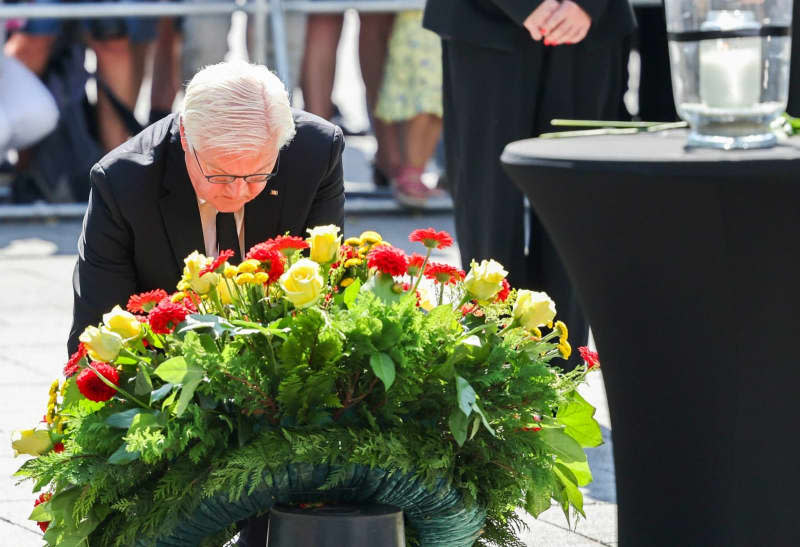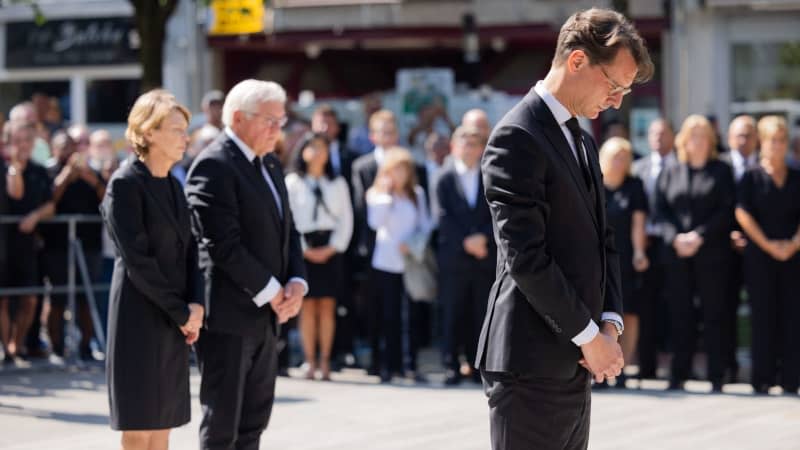Germany should continue to value the right of asylum but must take steps to limit irregular migration, German President Frank-Walter Steinmeier said on Sunday at a memorial service for victims of a suspected Islamist attack last week in Solingen.
Germany “for good reason” has offered a refuge and safety to those fleeing warfare and oppression, as many Germans only managed to survive the Nazi regime because other countries opened their doors, Steinmeier said.
“We want to remain that country. And we can only remain so in the end if we are not overwhelmed by the number of those who (come) without the right to this special protection,” Steinmeier told roughly 450 gathered mourners.
A 26-year-old Syrian man who was living in a nearby refugee residence was arrested in the wake of the stabbing rampage, which killed three people and injured eight others at a local festival in the western German city.
He is being held on suspicion of murder, suspected membership in the Islamic State terrorist group and other charges.
The Islamic State is claiming responsibility for the attack, but German authorities are still investigating the claim.
The suspected attacker is believed to have evaded a deportation order in Germany, something that has helped fuel a bitter debate in the country over asylum and migration policy.
“And we will only remain this country if those seeking protection abide by the laws of our country. Only then will we be able to maintain acceptance among the population,” Steinmeier said on Sunday.
The president called for the government and the political opposition to work together to achieve the “huge task” of enforcing immigration laws and creating workable rules to manage migration and asylum claims.
Attack hit ‘core of our national identity’
Steinmeier said that the act of bloodshed strikes at the heart of “a friendly, open and diverse country,” he said.
“It strikes us at the core of our national identity in which people live together peacefully despite all differences and want to live together – people who have lived here for generations as well as those who have arrived later,” Steinmeier said at the service in the city’s performing arts theatre.
In his eulogy, the German president said the perpetrator was targeting, with his hatred, just as others have before him, this way of life.
In his eulogy, Steinmeier acknowledged that the German state had failed to keep “its promise of protection and security” in Solingen, and that any mistakes or shortcomings that failed to prevent the attack must be dealt wiht comprehensively.
Steinmeier, who had spoken privately to the relatives of those killed and injured, said he could hardly imagine what the families and friends “are going through, what you must be suffering, what hell you are going through.”
He charged that “fanatical Islamists want to destroy what we love” including an open society. While he acknowledged that people “feel fear and uncertainty,” residents must not allow themselves to be paralysed with fear.
Scholz: Germany must ‘learn lessons’
German Chancellor Olaf Scholz, who also took part in the memorial service, said in a post on X afterwards that the crime “hits us in the heart, it makes us angry.”
“We owe it to them [the victims] and their families to learn lessons from this,” Scholz wrote. “We mourn the dead of Solingen. We mourn with their families, with everyone in this city, with everyone in Germany.”
Scholz’s government proposed stricter rules on weapons, tight new limits on benefits for some asylum seekers and greater police powers to address suspected Islamist threats in the wake of the attack.
On Friday – for the first time since the Taliban retook power – a deportation flight to Afghanistan took off from Germany’s Leipzig/Halle Airport with 28 convicted Afghan criminals on board.
Also attending the memorial services were the president of Germany’s parliament, the Bundestag, Bärbel Bas; the state premier of North Rhine Westphalia, Hendrik Wüst; and the state’s Interior Minister Herbert Reul.











